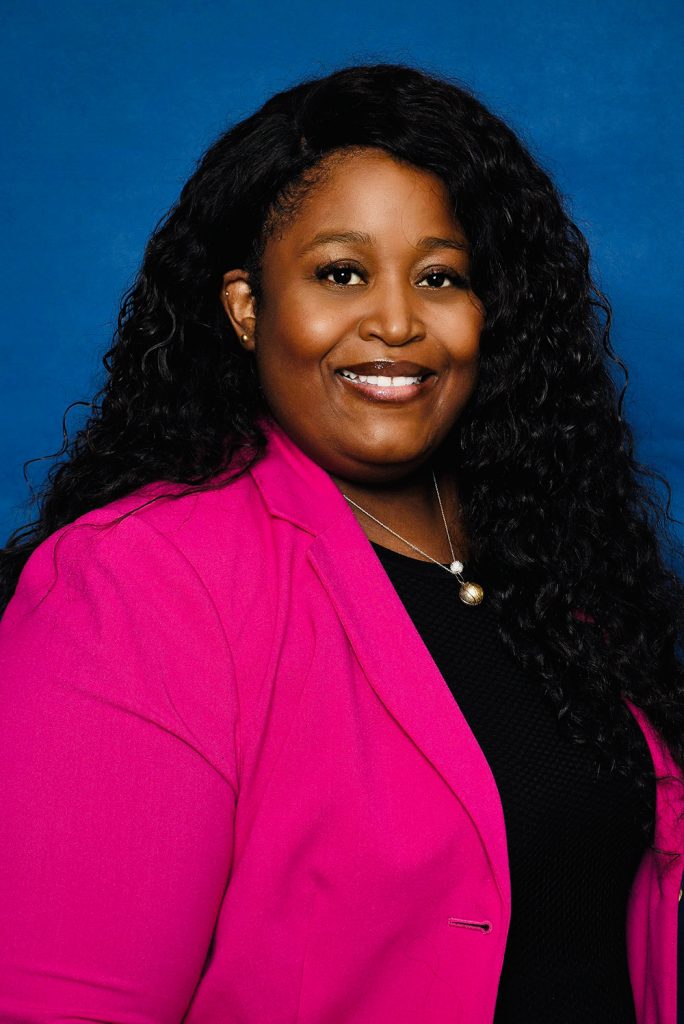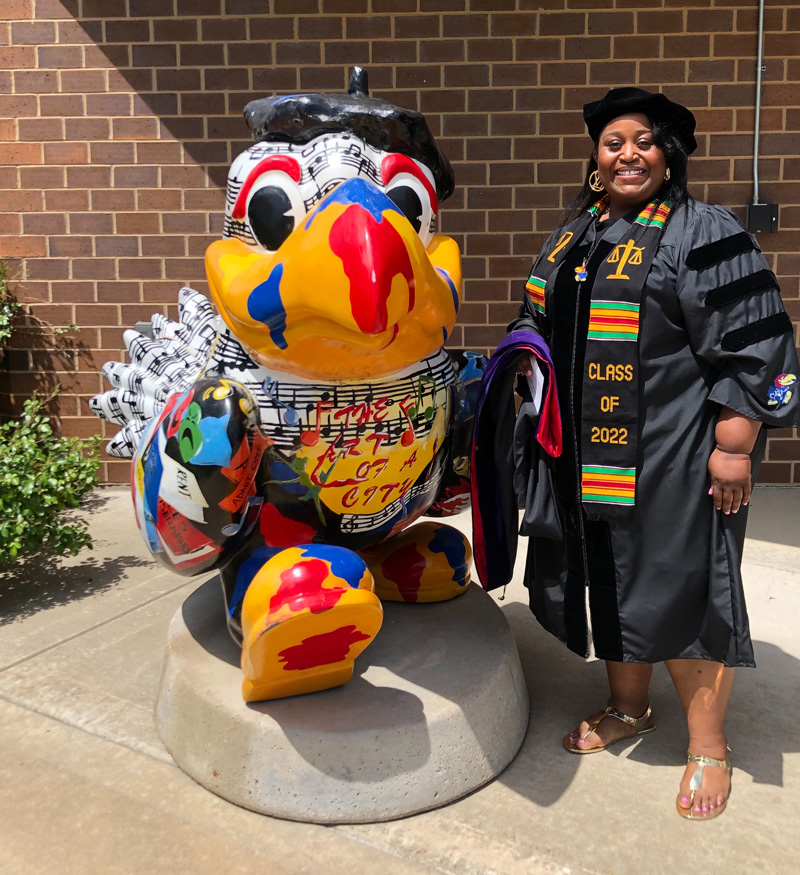Educator plans to use J.D., Ph.D. to address inequity
Lakisha Cooper lives by the belief, “be the change you want to see in the world.”
She recently graduated from the University of Kansas with two degrees that will allow her to follow that belief on a greater scale.
Cooper, L’22, completed her law degree at the same time as a doctoral degree in educational leadership and policy studies. She worked for 12 years as a special education and secondary English teacher in the Kansas City Public Schools before coming to law school. During that time, Cooper saw the challenges schools face in providing an equitable and adequate education to all students, she said.
“As I prepared to work as an educational leader, it became increasingly clear that policies and procedures that were created to reduce educational disparities only work when monitored and enforced,” Cooper said. “The decision to pursue these degrees concurrently made sense because there is tremendous work to be done to protect the legal rights of students and public education.”
Originally from Shawnee Mission, Kansas, Cooper earned her bachelor’s degree from the KU School of Business. While she worked as a teacher, she completed a master’s degree in special education from Northwest Missouri State University and a master’s degree in educational leadership from Arkansas State University.
Cooper’s passion for education intersected with her interest in the law. That intersection is also a fundamental part of our democracy, she said.
“In 1894, Frederick Douglas explained, ‘To deny education to any people is one of the greatest crimes against human nature.’ Education equals liberty and is a fundamental part of full inclusion in a democratic society,” Cooper said.
Working toward inclusion and equity shaped Cooper’s law school experience. Serving on the leadership team of the Black Law Students Association was Cooper’s most impactful activity outside of the classroom, she said. Cooper was treasurer of BLSA during the 2020-2021 academic year.
“The summer of 2020 was among the most trying times in terms of race relations in the United States,” Cooper said. The deaths of George Floyd and Breonna Taylor at the hands of law enforcement amplified the need for the legal system to eliminate gaps in protection that allow for the disparate treatment of marginalized individuals, she said.
“As protests ignited across the country in reaction to the killing of George Floyd and many others, as a leadership team we met and discussed the importance of this moment in history to unite and say enough is enough,” Cooper said.
“The crafting of the statement by BLSA to address the death of George Floyd, and the ongoing discussions on diversity with law school leadership, alumni, and members of the Lawrence community over the course of that year was an important part of my development as a law student and future attorney,” she said. “Change is not easy but for change to occur one must be willing to evaluate with a critical eye, be thoughtful and reflective, and ensure everyone has a seat at the table because representation matters.”
Cooper also participated in the Sports Law Society and KU Privacy and Cybersecurity Society. She was a member of the Judge Hugh Means Inn of Court professional organization.
Two KU Law professors helped Cooper develop as a writer and researcher, as she worked with them on projects that aligned with her interests and skills. Professor Lua Yuille invited Cooper to join a daily summer writing workshop that allowed her to meet other women working in the law, collaborate, and learn writing strategies. Cooper also worked with Professor Najarian Peters, supporting research on privacy and Black homeschooling families.
“The training and mentoring I received from Professor Peters helped me develop as a researcher and reminded me of the importance of prioritizing self-care,” Cooper said.
Last summer, Cooper interned with the U.S. Department of Education, Office of Civil Rights through KU Law’s Field Placement Program. Her duties included conducting legal research and working on the compliance and monitoring of cases the office handled.
“This internship provided me with an opportunity to seamlessly blend my education experience with my legal training and the chance to learn from veteran colleagues,” Cooper said. “The mentorship that I continue to receive because of this experience is invaluable and will be a part of my future success as an attorney.”
After graduating, Cooper is excited to pursue work in a variety of spaces on projects she is passionate about.
“I plan to continue my research on Black girls and barriers to educational attainment,” Cooper said. “I want to use my degree to influence policies and laws to benefit those who are in most need of support and advocacy.”
— By Margaret Hair
This post is the eighth in a series highlighting a few of the exceptional members of KU Law’s Class of 2022. Check out previous stories about Olivia Black, Parker Bednasek, Cortez Downey, Ashlyn Shultz, Dahnika Short, Trey Duran and Heddy Pierce-Armstrong, Stay tuned for more profiles as we celebrate this year’s graduating class.

